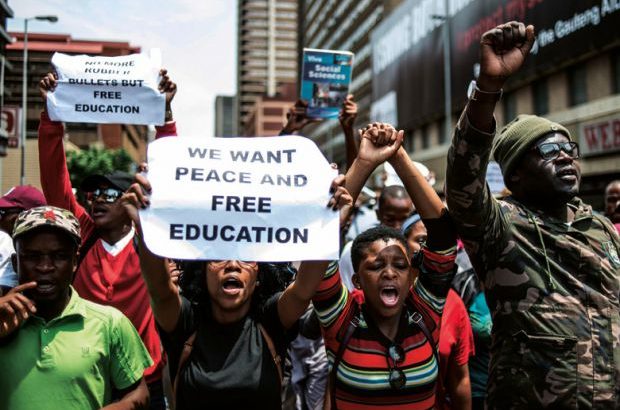Sudáfrica/Enero de 2017/Fuente: All Africa
RESUMEN: El Departamento de Educación Superior y Formación (DHET) siempre ha estado dispuesto a discutir con la Asociación de Estudiantes de Educación Continua y Formación de Sudáfrica (SAFETSA) todos los temas de interés para los estudiantes. De hecho, siempre hemos atendido a asuntos que han sido llamados a nuestra atención y que están bajo nuestro control. Sin embargo, es importante señalar que hay algunas cuestiones que no pueden resolverse en el corto o mediano plazo, ya que esto requeriría recursos adicionales del Gobierno, lo cual sólo puede ocurrir a través de los canales gubernamentales y parlamentarios establecidos. El Departamento de Educación Superior y Formación recibió un memorándum de SAFETSA fechado el 31 de diciembre de 2016, que enumera una serie de demandas y compromisos del departamento. Algo poco útil, SAFETSA dejó claro que no deseaba reunirse con el Ministro o la DG, ni ningún otro funcionario de DHET para ese asunto, agregando que también se embarcaría en un cierre de los colegios de EFTP a partir del 19 de enero de 2017 cuando el nuevo Año Académico se reanuda. Esta acción, dijo, continuaría hasta que se cumplieran todas las demandas.
The Department of Higher Education and Training (DHET) has always been willing to discuss with South African Further Education and Training Student Association (SAFETSA) all issues of concern to students. Indeed, we have always attended to issues that have been brought to our attention and that are within our control.
However, it is important to note that there are some issues that cannot be solved in the short to medium term, as these would require additional resources from the Government – which can only happen through the laid-down government and parliamentary channels.
SAFETSA’s demands:
The Department of Higher Education and Training received a memorandum from SAFETSA dated 31 December 2016, which listed a number of demands and commitments from the department.
Rather unhelpfully, SAFETSA made it clear that it did not wish to meet with the Minister or DG, or any other DHET official for that matter, adding that it would also be embarking on a shutdown of TVET colleges starting 19 January 2017 when the new academic year resumes. This action, it said, would continue until all the demands were met.
Background to, and the development of the TVET sector in recent years:
Up until the 31st of March 2015, the Technical Vocational Education and Training (TVET) sector was managed by provincial Education departments. In 2009 a decision was taken to move the Further Education and Training (FET) colleges to a national competency, resulting in the following action being taken:
An intergovernmental protocol was signed by the Minister of Higher Education and Training with the then MECs for Education in the provinces at that time.
Legislation was amended in 2012 to move the functions assigned to the MECs and provincial Heads of Education to the Minister and the Director-General.
New college councils were established and made operational as most of the colleges did not have constituted councils, as their term of office had expired.
The Minister also began to fill long-standing vacant management posts, especially those of principals and deputy principals.
Historically, personnel in colleges, other than management, were employed by the colleges and the subsequent legislation transferred them to the employ of the Department of Higher Education and Training. This meant that about 9 000 support personnel and 9 000 lecturers had to be migrated to DHET, with the process being concluded on 31 March 2015.
Intensive and complex processes were undertaken to ensure that funds allocated for the management of the FET system were moved to DHET. This required negotiations with each provincial Education department, as well as the national and provincial treasuries – and this was also concluded by 31 March 2015.
During the period 2010 to 2015, enrollment at colleges almost doubled from just over 420 000 to just over 710 535 students currently in all programmes offered in TVET colleges. Considerable funds were allocated by Sector Education and Training Authority (SETAs) and the NSF to achieve this.
A ministerial turnaround strategy was also instituted to provide support to colleges to enhance their governance, management and operations.
In 2009, very few colleges had qualified or competent finance officers. This necessitated the department, through the assistance of the South African Institute of Chartered Accounts, to appoint qualified Charted Accountants in each of the 50 public TVET colleges.
Subsequent to the appointment of the support CFOs, human relations generalists were also appointed to support the HR functions in the colleges.
Understanding that the rebranded FET Colleges had to be relevant and responsive, the names of the colleges were also changed to TVETs.
The PSET White Paper makes profound policy proposals to make TVETs institutions of choice, meaning that their curriculum also had to be reviewed, to provide more occupational and vocational qualifications.
During the last few years, the allocations to National Student Financial Aid Scheme (NSFAS) increased exponentially from R312 million serving 55 174 students, to the current R2,32 billion serving 256 904 students.
The conditions of service of the employees of all colleges were also substantially upgraded three years ago, after years of neglect.
The number of students in the artisan areas has also increased exponentially to over 25 000 per annum today.
There is no doubt that although much remains to be done in the sector, much has already been achieved. However, South Africa’s ongoing constraints with regards to the country’s low economic growth has put pressure on the TVET sector.
Importantly, most of the demands and concerns articulated in SAFETSA’s memorandum are not unrealistic.
Fuente: http://allafrica.com/stories/201701270381.html
Imagen de archivo








 Users Today : 187
Users Today : 187 Total Users : 35459782
Total Users : 35459782 Views Today : 347
Views Today : 347 Total views : 3418319
Total views : 3418319